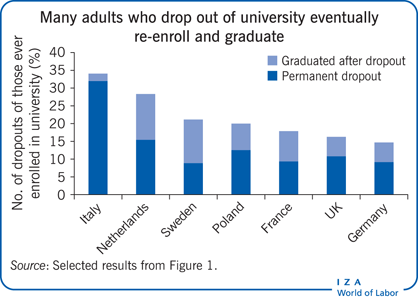Elevator pitch
With university education continuing to expand worldwide, university dropouts will make up a large group in future labor markets. Dropping out is routinely viewed as a negative indicator. However, data on university dropouts does not generally provide information on their labor market outcomes, so empirical evidence is sparse. The studies that have examined the issue show that dropping out can be more of an advantage than not having enrolled in university at all. Many dropouts are more likely than upper secondary school graduates with no university education to progress in their careers. And many graduate later in their life.

Key findings
Pros
Recent international surveys with information on university dropout experience provide comparable cross-country information on whether dropping out is permanent and how dropouts fare in the labor market.
Dropping out is often temporary: almost 40% of university dropouts graduate later in their life.
In about half the countries examined, university dropouts have better career progression than other upper secondary school graduates who are similar in many characteristics except university enrollment and dropout.
Dropouts fare best in countries with a low share of university graduates and a predominantly vocational orientation among upper secondary school graduates.
Cons
Most data focusing on university students do not include information on their labor market careers, so cross-national evidence on university dropouts’ labor market success is scarce.
Some international surveys that do include information on dropout experience and labor market status focus on a country’s entire population, and therefore small sample size makes in-depth research on sub-groups of dropouts impossible.
While theoretical frameworks can explain some of the country results, explaining dropouts’ labor market outcomes requires further examination of both educational systems and labor markets.